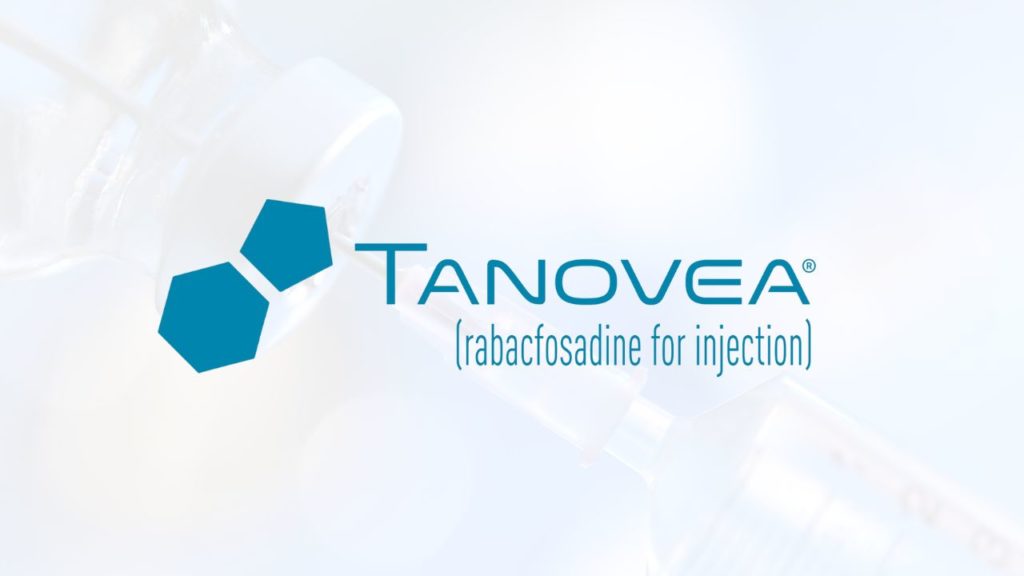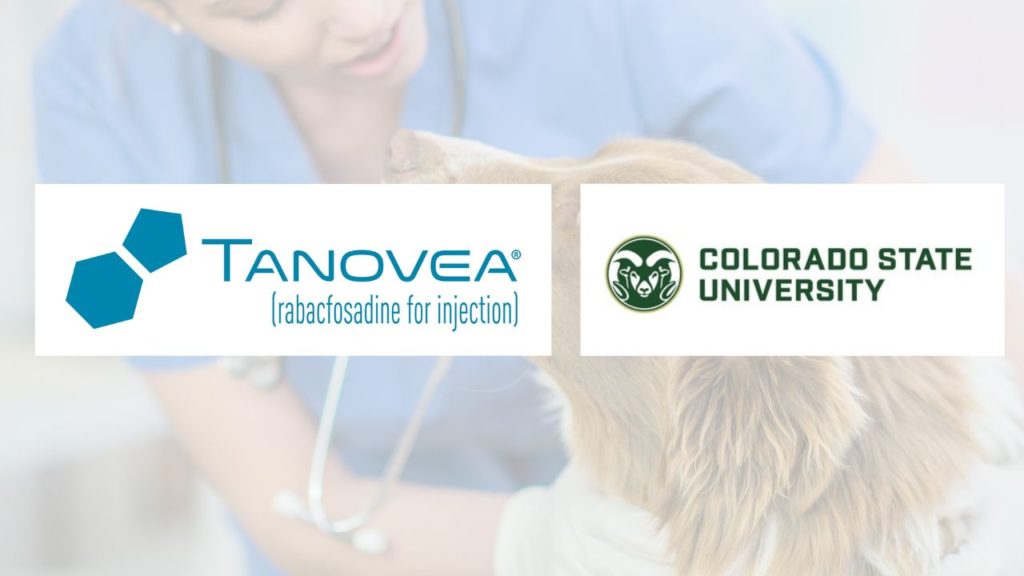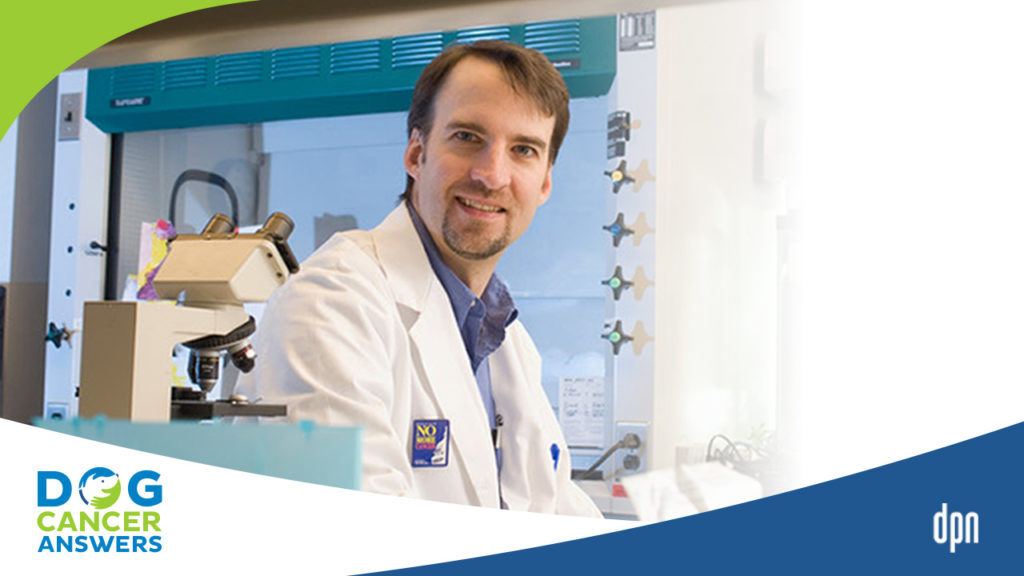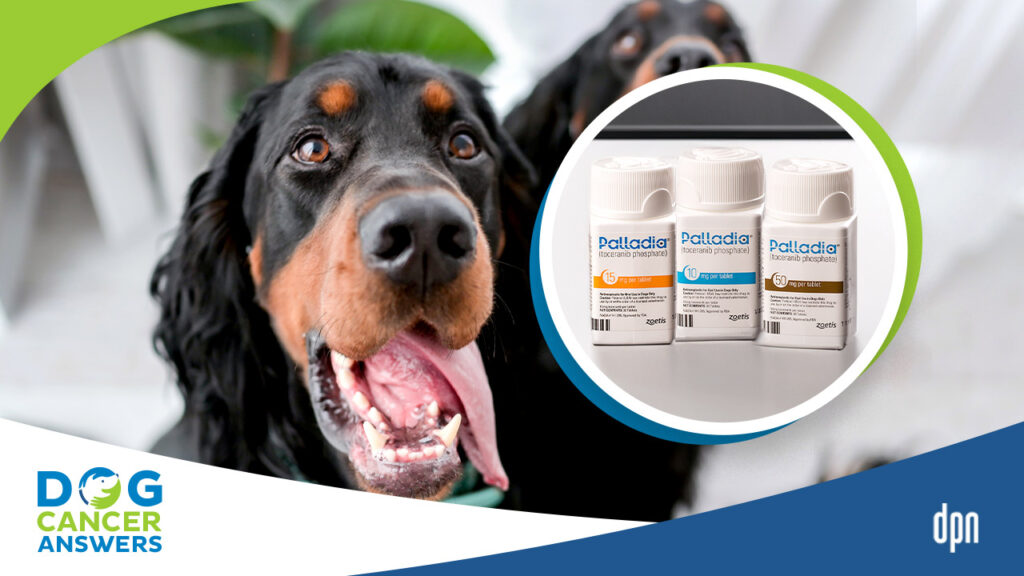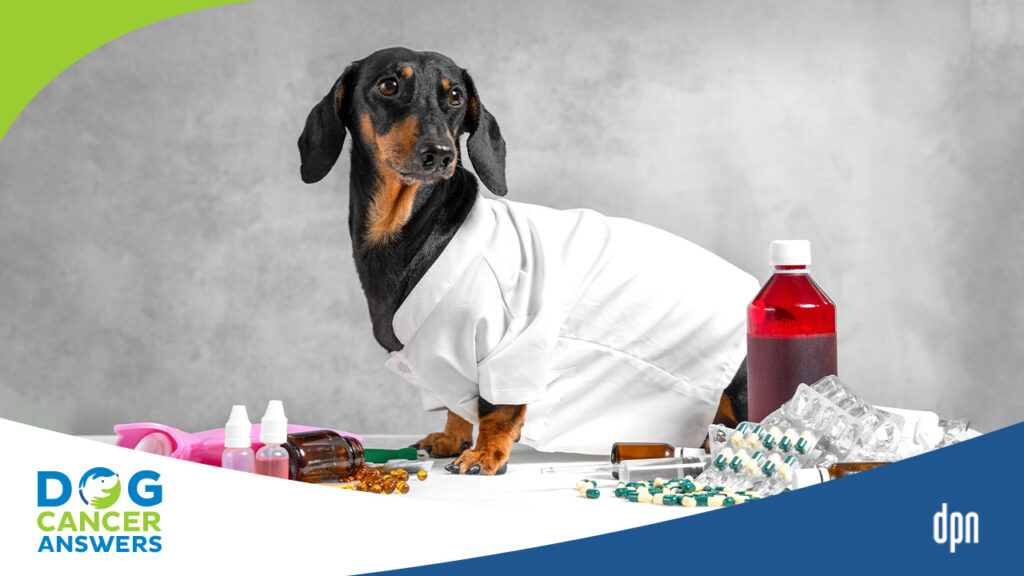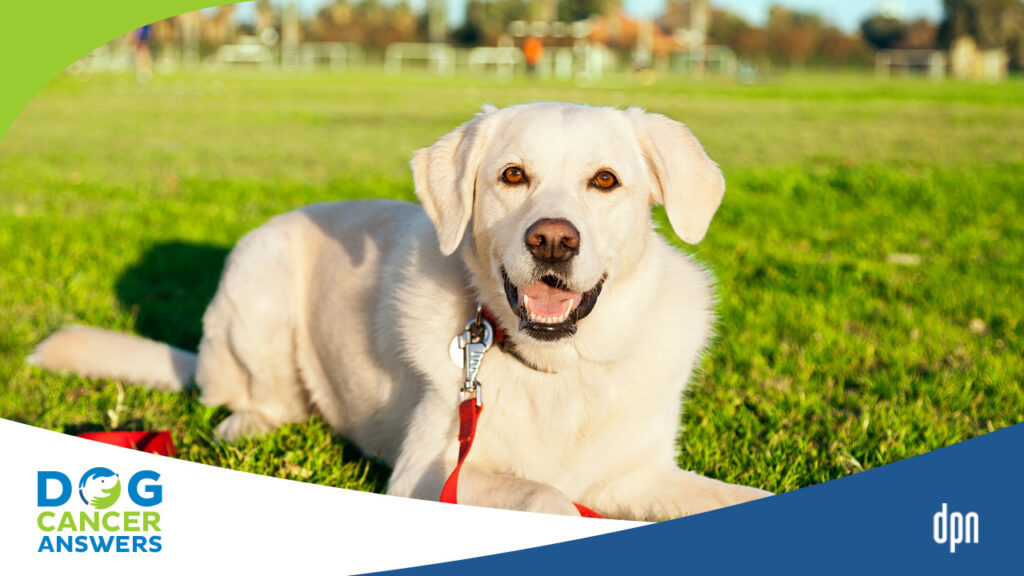EPISODE 55 | RELEASED May 18, 2020
Tanovea for Dogs with Lymphoma │ Dr. Demian Dressler Q&A
Would Tanovea have given Effie more time if it had been around in 2015? Is Tanovea good for dogs with lymphoma? Oh, and, one more question, one we ALL want to know the answer to: did I cause my dog’s cancer??
SHOW NOTES
Dr. Demian Dressler helps untangle a bunch of questions posed by Deborah about her dog’s cancer and her own contribution. This is a great episode to listen to if you’ve ever played the “what-if” game with your own dog cancer journey.
The name of the drug Deborah asked about is Tanovea.
>> Dr. Demian Dressler: Tanovea, could have potentially given your dog some extra time. I just don’t know quite how much that would have been.
>> Announcer: Welcome to Dog Cancer Answers where we help you help your dog with cancer. Here’s your host, James Jacobson.
>> James Jacobson: Thanks for listening to today’s Question & Answer show. If you have ever looked back on your dog’s life and wondered “what if” about his or her cancer, then this is a must-listen show.
That’s because we are taking a question from a loving dog Mom who is looking back at her dog Effie’s lymphoma five years ago and wondering if Tanovea, a drug that is sometimes used for rescue protocols in lymphoma cases, could have helped him if it had been around when he was sick.
But Deborah, our caller, also asks another, more painful question, one that maybe will resonate with you: did she somehow contribute to her dog’s cancer with poor quality food, or too much stress from traveling?
And in just a couple of sentences, Dr. Demian Dressler gives her the answer that her mind and heart have been waiting for.
Now let’s open our own hearts and listen carefully to Deborah’s questions and Dr. Dressler’s answers.
>> Deborah Silver: Hi, my name is Deborah Silver and I’m calling from Drexel Hill, Pennsylvania. Today I was reading something about a new drug called Tanovea that is in a approval stage where they’re doing testing, but allowing veterinarians and oncologists to prescribe this product for dogs with lymphoma cancer. And I wondered if you could tell anything about the efficacy and safety of Tanovea.
My dog, Effie, he died in February of 2015 and he had a six-month remission from his first round of chemotherapy. He had a three-and-a-half month remission his second round of chemotherapy, and then when it came to his third round he wasn’t responding, and the oncologist said that he was too sick to be having any other chemotherapy drugs tried on him, and he died.
And I just wondered if this Tanovea could have been used if it were in existence back in 2015, even after two courses of chemotherapy, could that drug also may have helped save my dog or prolonged his life? That would have been a wonderful thing to have had available to him.
And the type of breed my dog was was Canaani, an Israel breed, and I don’t think he’s on the list of dogs that are prone to getting lymphoma, but I do know that Canaani dogs do sometimes get lymphoma, and I just wondered, you know what might’ve brought it on?
Maybe it was just stress when we left him with friends when we went on different trips to Israel, but I think overall he had a happy life and I don’t know what could have caused his cancer. I did feed him dry commercial dog food, which I regret, for most of his life, and only giving him people food occasionally as treats.
But once he was diagnosed with cancer, I started cooking for him every day and I varied up his diet with chicken, salmon, fish, steak, hamburger, and it was hard to get him to eat because his appetite was compromised by the illness and by his treatment. But I think he got nutrients from the cooked food that I should have been cooking throughout his life, maybe that would have prevented him from having the cancer come on to begin with. I’d like to have that question answered.
>> James Jacobson: There’s a lot there in that question from Tanovea to what caused my dog’s cancer.
>> Dr. Demian Dressler: Right. There is a book, perhaps you may have heard of it. It’s called The Dog Cancer Survival Guide.
And I’m kind of kidding, but not really, when I say that.
And the reason why is because that’s a really broad ranging question. It’s kind of like, what else could I have done from my dog with cancer and what are the causes of cancer? And that was really the purpose of the book. And so it’s really hard to be succinct.
However, what I will say in terms of Tanovea — or Tanovea depending on where you’re from — yep. It’s got some anticancer effects. I don’t perceive it to be God’s gift for lymphoma. It uses a medication that gets turned into a drug that disrupts the DNA of dividing cancer cells. The preliminary data on it is that it’s not more effective than the standard treatments.
I think median life expectancy was give or take between six and seven months or so when it’s used for the first time, I believe. I could be a little off, but it’s right around there. It does have give or take 30/40% side effect rate commonly, which is not that unusual, but a lot of those are pretty minor, but it’s also not free of side effects.
And, uh, it’s used now, not very widely, but it seems to be used at this moment as part of a rescue protocol, which means a second round where you’re using cancer drugs that have a different mechanism because your cancer cells have grown resistant. So that’s exactly what you’re talking about. You talked about multiple, three different potential rounds of chemotherapy, so two of those are rescue protocols, that means they came after earlier chemo rounds after the cancer came back.
So to answer your question, and I hate to say yes, but Tanovea or Tanovea, could have potentially given your dog some extra time. I just don’t know quite how much that would have been.
The second question has to do with why did my dog get cancer, which is a colossal and sprawling question.
I do not have one answer for that.
I will say in terms of breed tendencies, remember those lists are collated based on people’s input, and most of those lists concerning breeds and representation are compiled in the United States and the United Kingdom and not Israel. And by the way, there’s variation between different countries, you’ll see too, which is interesting. There’s geographical breed tendencies also. So genetics is always a piece of cancer.
But you know, again, I wrote about this in the book. You’ve got electrical fields, you’ve got carbohydrates, you’ve got dietary carcinogens, you’ve got inhaled carcinogens, you’ve got industrial pollutants, you’ve got melatonin deficiency.
You’ve got a lot of different additive factors that all act together to contribute to the formation of cancer, cause it’s not an overnight event.
And what I also hear between the lines, perhaps you wondering about is, did I cause my pet’s cancer, for example, by going on a vacation, or going on a trip?
And those types of things I think torture people, those questions.
And the answer is no.
I don’t think that you caused your dog’s cancer, you know, in these ways. I think that’s unlikely because remember, cancer takes time and it’s a multistage event. So I would be careful to not beat yourself up over any of this.
>> James Jacobson: Deep question. Thank you.
I’d like to thank Dr. Dressler for answering Deborah’s questions. It’s helpful to know that Tanovea is not the end all and be all when it comes to lymphoma, but it does have its place as a rescue drug.
But personally, I found his other answers even more useful. No, Deborah, you didn’t cause your dog’s cancer. Cancer starts long before we know it’s there, and there are a lot of factors that have to go wrong for it to start, take hold, and grow big enough to become a problem.
Dr. D says “be careful to not beat yourself up on any of this.” And he’s so right.
I know I need to hear that message from time to time, and I hope it helped you, Deborah. Thanks so much for your question and for articulating the often unspoken concern that so many other dog lovers have: Did I somehow cause my dog’s cancer by mistake?
That’s the message that we really want to get out here: it’s not your fault, there are things that you can do, and your dog, ultimately, will help guide you through the process of fighting cancer.
That’s what this show, and this podcast, and the book The Dog Cancer Survival Guide that Dr. Dressler and Dr. Ettinger wrote, is all about.
The best way to keep up with Dr. D’s wisdom, and the wisdom of all of our full-spectrum veterinarians, is to hit the subscribe button, write reviews, and tell friends and your veterinarian about this show.
It’s how we grow and it is the best way that you can help support us so that we can support as many dog lovers as possible thru what can be a very difficult time.
–TOUCH TONE SFX–
Those touch tones are a reminder to me and to you that we do take listener calls, like Deborah’s call, and you can pose a question on our Listener Line any time. Just call 808-868-3200 and one of our full spectrum veterinarians could answer your question on a future episode of Dog Cancer Answers. Speaking of that website, that’s where you can listen to or download our full back catalog. It’s a great way to help give you the information that you need to help optimize your dog’s life quality and longevity.
We would like to thank our sponsor today, The Dog Cancer Survival Guide book by Demian Dressler and Susan Ettinger. It is available wherever fine books are sold both online and in physical bookstores. And if you’d like to help support this show, get it right away direct from the publisher. You can get either the paperback (with free shipping anywhere in the USA) or the ebook edition, and the ebook is just $9.95. To get them go to this website: DogCancerBook.com. And because you are a listener to this show, if you use the promo code “podcast” you can save 10%. The website again: DogCancerBook.com and then when you check out, use the promo code “podcast” for 10% off. That is www.DogCancerBook.com.
I’d like to thank Dr. Demian Dressler for being our guest today. If you’d like to reach out to him, his website is VetinKihei.com, that is Vet in Kihei, I will spell that, K-I-H-E-I, dot com. Also, our thanks to Deborah for that vulnerable and heartfelt question.
Until next time, I am James Jacobson. From all of us here at Dog Cancer Answers and Dog Podcast Network, we wish you and your dog a warm Aloha.
>> Announcer: Thank you for listening to Dog Cancer Answers. If you’d like to connect, please visit our website at DogCancerAnswers.com or call our Listener Line at 808-868-3200.
And here’s a friendly reminder that you probably already know: this podcast is provided for informational and educational purposes only. It’s not meant to take the place of the advice you receive from your dog’s veterinarian. Only veterinarians who examine your dog can give you veterinary advice or diagnose your dog’s medical condition. Your reliance on the information you hear on this podcast is solely at your own risk. If your dog has a specific health problem, contact your veterinarian.
Also, please keep in mind that veterinary information can change rapidly. Therefore, some information may be out of date.
Dog Cancer Answers is a presentation of Maui Media in association with Dog Podcast Network.
Hosted By
SUBSCRIBE ON YOUR FAVORITE PLATFORM
Topics
Editor's Picks
CATEGORY


